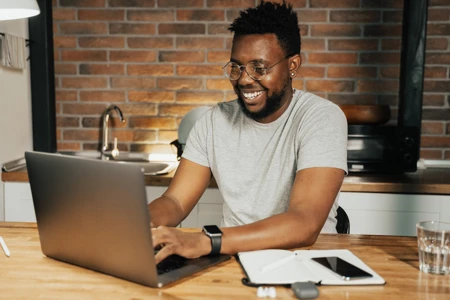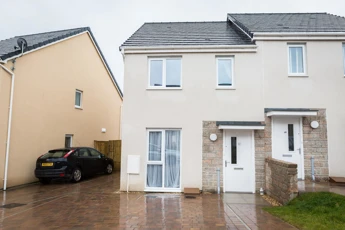 Written by: Danny Belton - Head of Lending
Written by: Danny Belton - Head of Lending
When it comes to getting a mortgage on your own, your choices are not as limited as you may think. In fact, a ‘single person mortgage’ is no different to a joint application. There are options available to you, and we’re here to help.
In this article:
- Can I get a mortgage on my own?
- What are my mortgage options?
- Is it harder to get a mortgage as a single person?
- How much can you borrow on your own?
- What size deposit will you need?
- Can you get a mortgage on your own with bad credit?
- How to increase your chances of getting a mortgage
- How a mortgage adviser can help you get a mortgage on your own
- Frequently asked questions
- Related articles
Can I get a mortgage on my own?
You can get a mortgage as a single person, and many people choose to do so. About 9% of all mortgages come from single-income borrowers with a loan-to-income (LTI) ratio of 4 or higher1. This means they are borrowing money at four times their annual salary. This climbs to 33.8% for people borrowing with an LTI of 3 or higher. This number also represents your borrowing power, or affordability. Most lenders calculate your borrowing power at a rate of 4.5x your salary.
Let’s say you earn £35,000 per year. If you borrowed four times your salary, you’d have a mortgage of £140,000. This doesn’t include any deposit you put down, since this doesn’t count as borrowing.
Your affordability also plays a role, and this is calculated around your monthly income and outgoings, as well as the current interest rates available. This figure also takes into account where interest rates could go, as lenders want to ensure you can meet your repayments should interest rates increase.
If you have the right deposit amount, meet the affordability requirements, and have a good credit score, there’s no reason why you can’t get a mortgage. This is something a mortgage adviser can help you with, so get in touch to find out more about your options.
What are my mortgage options with a single income
You should be able to get a standard mortgage on a single income if you meet all the requirements. However, if the property you’re looking at is worth more than your general affordability, there are some options available to help you get on the property ladder:
Increase your deposit
Increasing the size of your deposit could make it easier for you to buy a property that is worth more than your overall affordability. We understand that this is easier said than done, but it may be worth looking at saving for a bit longer or speaking to family about a gifted deposit.
Shared ownership
Shared ownership basically means that you get a mortgage on a share of a property, whilst you pay rent on the remaining share. The share you buy can be between 25% and 75%, and you can start to buy more shares in the property until you eventually own 100% of the home. Currently, shared ownership is only available on new builds, but there are plenty of options available across the country.
Read more about shared ownership in our dedicated article.
Arran Sagoo, a shared ownership homeowner, said that the scheme made it possible for him to get on the property ladder. He said: “House prices seem to go up so much faster than salaries, and with lenders asking for 4.5x your baseline salary, I wasn’t going to get something that worked for me. Shared ownership made it possible for me to get something I could call my own.”
Using a guarantor
Having a mortgage guarantor could help you get a bigger mortgage. However, if you can’t meet your monthly repayments, they will have to make the payments for you. The guarantor puts their own home or savings up as collateral against your borrowing, so if you can’t afford the property, their home may be at risk.
The potential boost to your borrowing power depends on the guarantor’s financial situation and circumstances. This is not a decision that should be made lightly by either party, so read more about mortgage guarantors in the article below.
First Homes Scheme
The First Homes Scheme was officially launched by the UK government in 2021 to help first time buyers and key workers buy their first property. They do this by offering new-build properties to first time buyers and key workers at a 30-50% discount.
To qualify for the scheme, you must:
- Be a first time buyer (key workers are prioritised)
- You must not earn more than £80,000 (£90,000 in London)
- The home must not be worth more than £250,000 (£420,000 in London)
- You must have a connection to the area in which the property is located (family or employment)
Keep in mind that the First Homes Scheme is specific to the area and developer, so do your research and find out if there are options local to you.
Is it harder to get a mortgage as a single person?
Buying a house on your own comes with challenges, but it is not impossible. The two major differences are your deposit and your overall affordability. As a solo borrower, you’ll probably be saving for the deposit on your own and your mortgage affordability will be based on one income, not two.
This means that, because your mortgage affordability will be more limited (though this depends on your salary), you will only need to save a deposit based on a percentage of that. While it can be trickier, the ratios of savings to income and income to affordability are smaller than they seem.
Try our affordability calculator to get a better sense of how much you could afford on a mortgage.
How much can you borrow on your own?
Your affordability (or how much you can afford to borrow) is mostly based on your annual income. For a single person mortgage, you’d multiply your salary by the lender’s affordability rate (usually 4-5 times your salary).
If you have a bigger deposit, you could buy a property worth more.
How much can I borrow?
What size deposit will you need?
At a minimum, you will need a 5% deposit. The higher your deposit, the more options you have. You may get access to better interest rates by building a bigger deposit.
The size of your deposit ultimately depends on your personal goals and circumstances. If you want to increase your deposit but aren’t sure where to start, check out the articles below:
Can you get a mortgage on your own with bad credit?
Having a bad credit score doesn’t immediately stop you from getting a mortgage. It may be more challenging, but this is where a mortgage adviser can help. They have access to deals not available on the high street and could work with specialist lenders to find you a deal that works for your unique circumstances.
Check out the article below to get a sense of what your credit score should look like:
How to increase your chances of getting a mortgage
If you’re considering getting s mortgage on your own, there are a few things you can do to help streamline the process and increase your chances of getting a mortgage on your own. Here’s what you can do:
Clear any debt
Your debt-to-income ratio is an important part of your overall mortgage affordability, since your monthly expenses include debt repayments. If you can reduce this, you could improve your affordability. Ultimately, however, lenders want to see that you’re managing your debt confidently, not missing payments, and not struggling to make ends-meet.
Be realistic about your borrowing
Set your borrowing limit and stick to it. You need to be able to comfortably afford to pay your mortgage each month, and if a lender thinks you can’t do this, they won’t approve your mortgage application. The lender will provide you with an indicative figure for what you could borrow, but you don’t actually have to borrow that much. Give yourself some leeway and be honest with yourself about what you can comfortably afford on your own.
Save, save, save
With options like the mortgage guarantee scheme available, saving for a deposit might not be as difficult as you initially think. That being said, the bigger your deposit, the more options you will have. Bigger deposits lower your loan-to-value ratio, which means you present less of a risk to the lender. This could mean lower interest rates, reducing your overall amount owed.
Protect your finances
Getting a single person mortgage means you’re solely responsible for the payments. Different forms of protection, such as income protection or mortgage protection could cover your payments or total debt should something happen. Here are some of your options, but they can be tailored to your unique goals and needs:
- Do I need critical illness cover?
- Why do I need life insurance?
- What is income protection insurance?
- Do I need a protection policy for my mortgage?
Not sure if being insured is worth it? Check out our article about the myths of mortgage protection insurance.
How a mortgage adviser can help you get a mortgage on your own
Whether you’re looking for a single person mortgage or not, speaking to a mortgage adviser means you have access to expert advice for mortgages as well as related insurances, including life insurance, income protection, and critical illness. Get in touch with us today to find out your options:
Getting a mortgage on your own doesn’t have to be difficult, and an adviser is perfectly placed to help make the process as seamless as possible. With their expert advice, they can help you find a mortgage that suits your specific needs. They’ll give you an overview of what’s involved, the evidence you need, plus the types of mortgages that may be available to you.
Frequently asked questions
The deposit requirement doesn’t change if you’re applying on your own, so you will still only need a minimum of 5%.
Yes. you can, but you’ll be assessed as a sole borrower. Keep in mind that if your partner is still contributing to the payments, they may have some entitlement to some of the value, depending on the circumstances and agreements.
There is no set salary you need to earn to get a mortgage. Lenders look at your personal affordability and assess each case individually. If you’re classed as low-income then some lenders will let you count these payments as part of your income.
Yes, you can. It will likely involve a transfer of equity, or buying out the other person. This typically means remortgaging, where you can stick with your current lender or consider a new lender. Keep in mind that you may incur early repayment charges.
Read this article for more information: The ins and outs of transferring a mortgage
If you are eligible for shared ownership then you can use the scheme as a single person. Nothing else changes about the process!
Important information
Your home may be repossessed if you do not keep up repayments on your mortgage.
There may be a fee for mortgage advice. The actual amount you pay will depend on your circumstances. The fee is up to 1% but a typical fee is 0.3% of the amount borrowed.
Related Articles
How do mortgage affordability assessments work?
It's important to go through affordability checks to make sure you can comfortably afford to repay your mortgage. Here's how they work.
Does it matter if the market is going up or down?
If you are buying and selling a home, how much does the housing market matter?
What is a fixed mortgage deal?
Choosing how long to fix your mortgage for depends on a range of factors. Here's your quick guide to deciding on the right mortgage deal for your circumstances.
No posts currently available
Ready for some advice? - arrange a call back
References:




